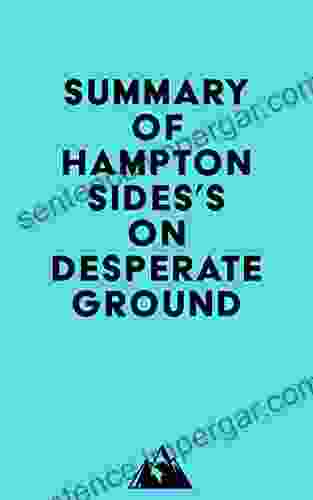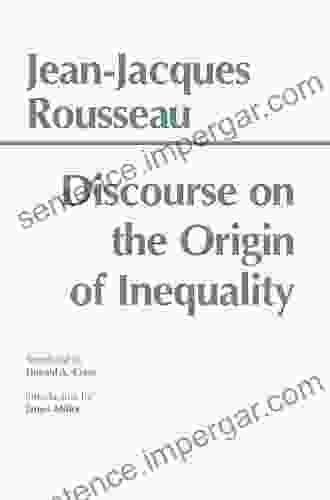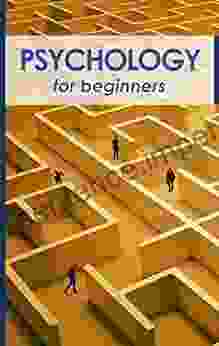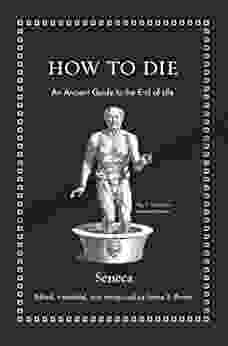Unveiling the Roots of Inequality: A Journey into Rousseau's Discourse

: Unveiling the Discourse

4.6 out of 5
| Language | : | English |
| File size | : | 396 KB |
| Text-to-Speech | : | Enabled |
| Screen Reader | : | Supported |
| Enhanced typesetting | : | Enabled |
| Word Wise | : | Enabled |
| Print length | : | 116 pages |
In the annals of political philosophy, few works have sparked as much debate and controversy as Jean-Jacques Rousseau's Discourse on the Origin of Inequality. Published in 1755, this groundbreaking treatise delved into the profound question of how and why inequality arose in human societies.
With his characteristic eloquence and incisive analysis, Rousseau challenged prevailing notions of natural hierarchy and divine right, arguing instead that inequality was a product of social and political institutions. Through a thought-provoking exploration of the "state of nature," the "social contract," and the origins of property and government, Rousseau laid the foundation for a more egalitarian and just society.
Exploring the Origins of Inequality
At the heart of Rousseau's discourse lies a profound inquiry into the origins of inequality. He begins by positing a hypothetical "state of nature" in which all humans are equal, free, and self-sufficient. In this idyllic state, there is no private property, no competition for resources, and no social stratification.
However, Rousseau argues, this idyllic state was not destined to last. As societies grew and developed, certain individuals began to accumulate property and power, leading to the emergence of social hierarchies and economic disparities. This process, Rousseau contends, was exacerbated by the of private property, which created incentives for greed and competition.
The Social Contract and the Rise of the State
As inequality took hold, Rousseau argues, humans faced a fundamental choice. They could either resign themselves to the chains of tyranny and oppression or enter into a "social contract" that would protect their natural rights and freedoms.
The social contract, as envisioned by Rousseau, was not a mere agreement between individuals but a collective commitment to a just and equitable society. Through this contract, individuals surrendered some of their natural freedoms in exchange for the protection and benefits of living in an organized society.
However, Rousseau cautions, the social contract is only as strong as the volonté générale, or the general will. When the general will is corrupted by special interests or the pursuit of power, the social contract can be broken, leading to tyranny and oppression.
The Path to a More Just Society
Rousseau's discourse does not merely diagnose the origins of inequality; it also offers a path to a more just and egalitarian society. He argues that the only legitimate government is one that is based on the consent of the governed and that respects the natural rights and freedoms of all citizens.
Rousseau's vision of a just society is one in which property is more evenly distributed, wealth is not concentrated in the hands of a few, and all citizens have equal access to education and opportunity. He believed that by returning to the principles of the social contract and by fostering a strong sense of community and civic virtue, societies could overcome the scourge of inequality and create a more just and harmonious world.
Legacy and Impact
Rousseau's Discourse on the Origin of Inequality has had a profound impact on political thought and social movements throughout history. Its powerful critique of inequality and its call for a more just society have inspired revolutionaries, reformers, and social activists from the French Revolution to the present day.
Rousseau's work has also sparked ongoing debates about the nature of human nature, the origins of the state, and the possibilities for social change. While some critics have argued that Rousseau's vision of a perfect society is utopian and unrealistic, his ideas continue to resonate with those who believe that a more just and equitable world is both possible and necessary.
Rediscovering Rousseau's Discourse
For anyone seeking a deeper understanding of the origins of inequality, the nature of human society, and the path to a more just world, Rousseau's Discourse on the Origin of Inequality remains an essential read. This timeless work offers a provocative and insightful exploration of one of the most pressing issues of our time.
Free Download your copy of Discourse on the Origin of Inequality today and embark on an intellectual journey that will challenge your assumptions and inspire you to think critically about the world around you.
4.6 out of 5
| Language | : | English |
| File size | : | 396 KB |
| Text-to-Speech | : | Enabled |
| Screen Reader | : | Supported |
| Enhanced typesetting | : | Enabled |
| Word Wise | : | Enabled |
| Print length | : | 116 pages |
Do you want to contribute by writing guest posts on this blog?
Please contact us and send us a resume of previous articles that you have written.
 Book
Book Novel
Novel Page
Page Chapter
Chapter Text
Text Story
Story Genre
Genre Reader
Reader Library
Library Paperback
Paperback E-book
E-book Magazine
Magazine Newspaper
Newspaper Paragraph
Paragraph Sentence
Sentence Bookmark
Bookmark Shelf
Shelf Glossary
Glossary Bibliography
Bibliography Foreword
Foreword Preface
Preface Synopsis
Synopsis Annotation
Annotation Footnote
Footnote Manuscript
Manuscript Scroll
Scroll Codex
Codex Tome
Tome Bestseller
Bestseller Classics
Classics Library card
Library card Narrative
Narrative Biography
Biography Autobiography
Autobiography Memoir
Memoir Reference
Reference Encyclopedia
Encyclopedia James Fieser
James Fieser James C Carpenter
James C Carpenter Jeanne Liedtka
Jeanne Liedtka Janae B Weinhold Phd
Janae B Weinhold Phd James M Dennis
James M Dennis James Monroe
James Monroe James Bamford
James Bamford Jeff Bennington
Jeff Bennington Jean Antonello
Jean Antonello James L Nelson
James L Nelson Jan Assmann
Jan Assmann Jasper Burns
Jasper Burns Jan H Jensen
Jan H Jensen Janet Sayers
Janet Sayers Jan Paulsson
Jan Paulsson Jc Tefft
Jc Tefft James P P Horn
James P P Horn James E David
James E David Jannah Firdaus Mediapro
Jannah Firdaus Mediapro Jayme Adelson Goldstein
Jayme Adelson Goldstein
Light bulbAdvertise smarter! Our strategic ad space ensures maximum exposure. Reserve your spot today!

 Dillon HayesGrandmother's Story of Bringing Grandchildren to Jesus: A Journey of Faith,...
Dillon HayesGrandmother's Story of Bringing Grandchildren to Jesus: A Journey of Faith,...
 Mario SimmonsMore Unauthorized Essays on Joss Whedon's Firefly Universe: A Comprehensive...
Mario SimmonsMore Unauthorized Essays on Joss Whedon's Firefly Universe: A Comprehensive... Ronald SimmonsFollow ·19.1k
Ronald SimmonsFollow ·19.1k Caleb LongFollow ·10.4k
Caleb LongFollow ·10.4k Derrick HughesFollow ·6.9k
Derrick HughesFollow ·6.9k Curtis StewartFollow ·12.2k
Curtis StewartFollow ·12.2k Victor TurnerFollow ·11.4k
Victor TurnerFollow ·11.4k Robin PowellFollow ·17k
Robin PowellFollow ·17k Jorge AmadoFollow ·11k
Jorge AmadoFollow ·11k Art MitchellFollow ·11.6k
Art MitchellFollow ·11.6k

 Jacob Foster
Jacob FosterPrinciples and Persons: The Legacy of Derek Parfit
Derek Parfit's 1984 book,...

 Leo Mitchell
Leo MitchellPartners For Life: Raise Support For Your Missionary Work...
Are you a missionary or ministry leader...

 Blake Kennedy
Blake KennedyOn Desperate Ground: A Gripping Account of World War II's...
Hampton Sides' "On...

 Duane Kelly
Duane KellyCriminal Minds Sociopaths Serial Killers And Other...
In the realm of criminology,...

 Craig Blair
Craig BlairHome Repair: The Ultimate Guide to Fix, Maintain, and...
Welcome to the...

 Elmer Powell
Elmer PowellThe Organic Grower Guide to Mycorrhizae Science for...
Unlock the Secrets of Soil...
4.6 out of 5
| Language | : | English |
| File size | : | 396 KB |
| Text-to-Speech | : | Enabled |
| Screen Reader | : | Supported |
| Enhanced typesetting | : | Enabled |
| Word Wise | : | Enabled |
| Print length | : | 116 pages |








